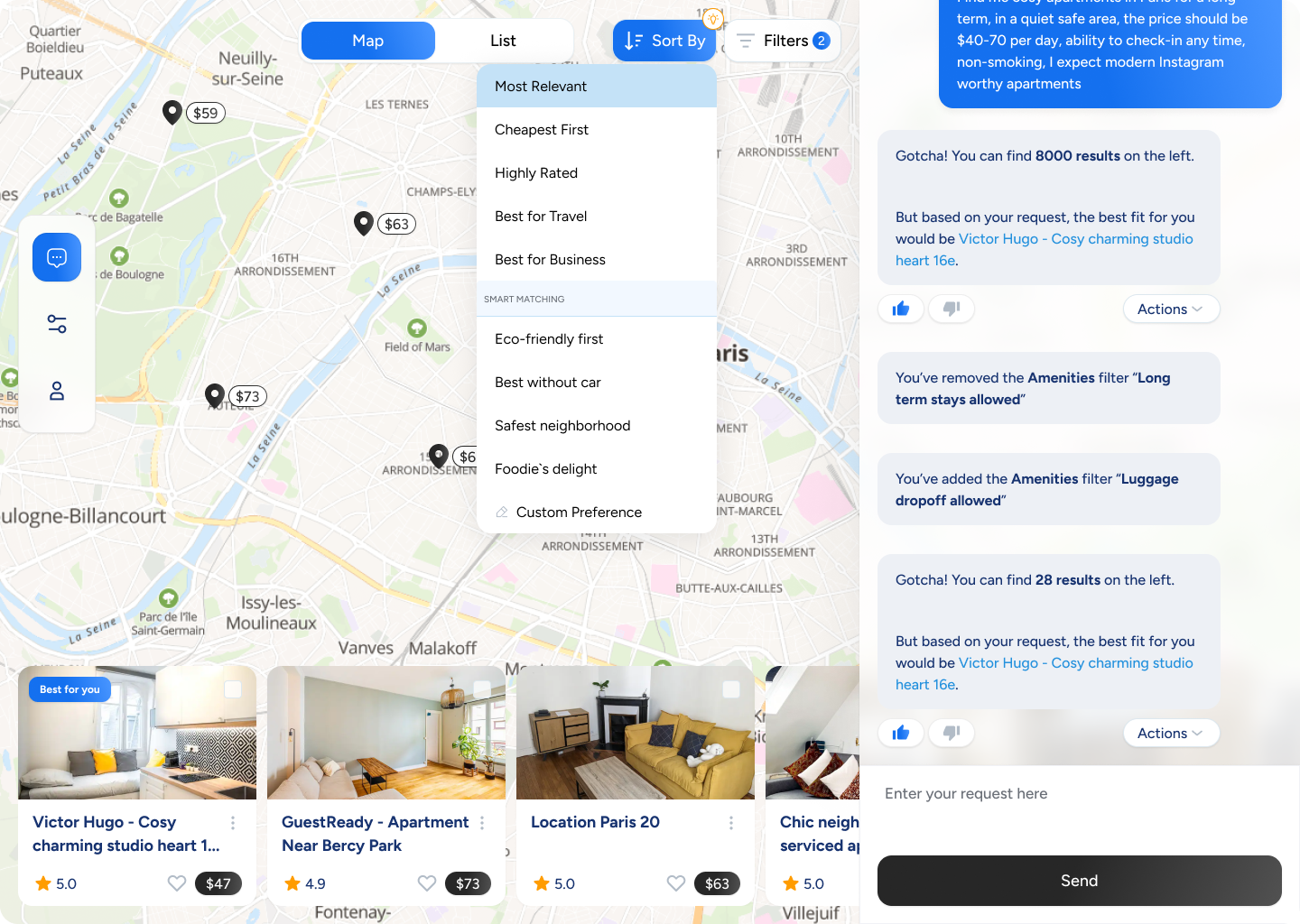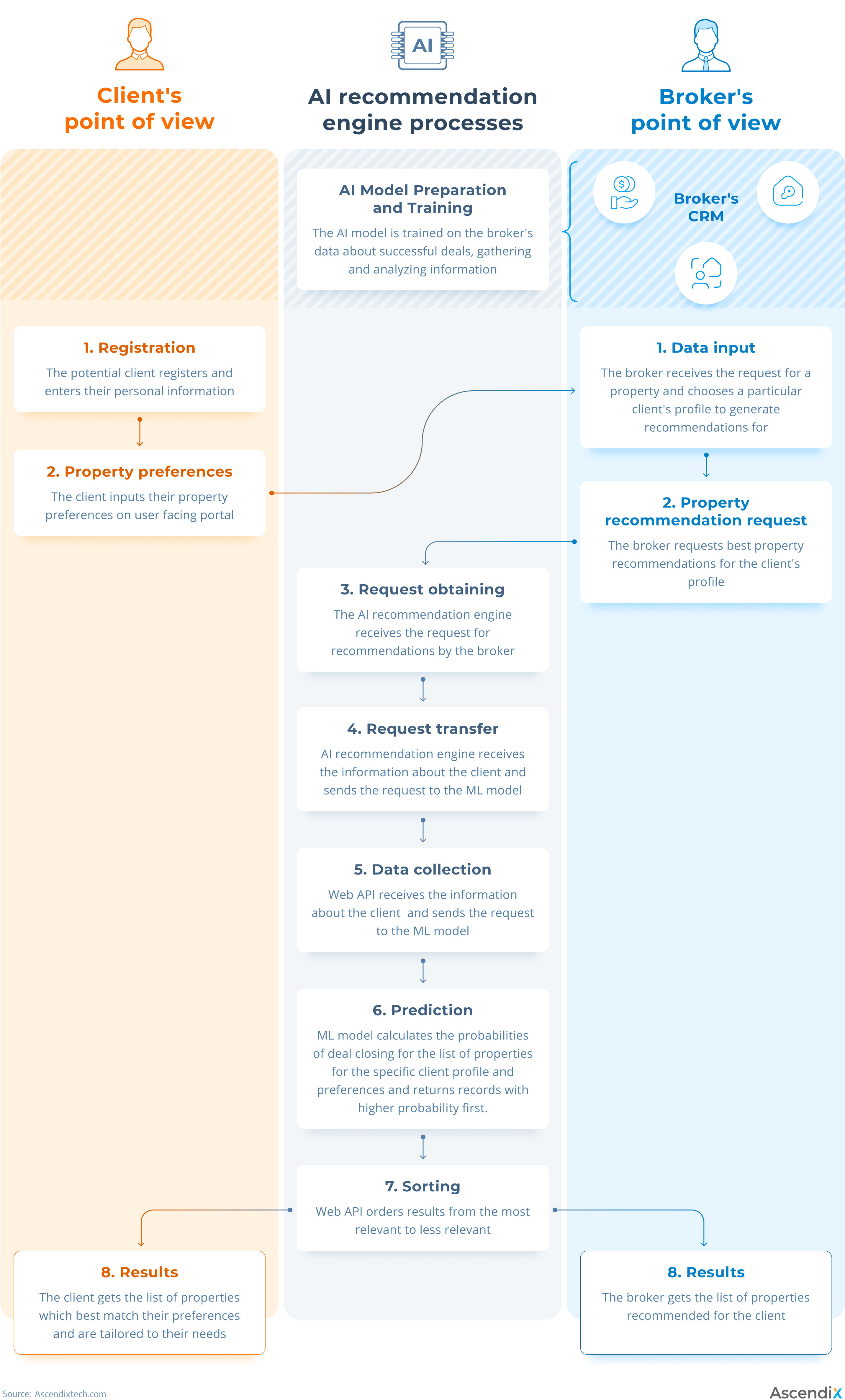Want to Integrate AI into Your Existing Real Estate Solution?
See how AscendixTech can help you close more deals and improve your workflow with the help of AI.
Imagine a world where your property search is as personalized and efficient as your Netflix recommendations. This level of sophistication, tailored to your preferences and behavior, can now be harnessed to revolutionize the way we find and choose properties in the real estate market.
In real estate, the traditional approach of endless property listing portals with vast amounts of information is becoming outdated. Consumers don’t need more data; they need the right data. This shift in mindset is where AI recommendation systems come into play, reshaping how property portals deliver value to users.
An AI recommendation system is an artificial intelligence algorithm that recommends products or services to users based on their preferences and behavior and then presents the recommended items in a ranked list. In this article, we further delve into what AI recommendation systems are, how they work, and describe the real-life use cases of an AI recommendation engine in the real estate industry.
An AI recommendation system in real estate is the use of artificial intelligence (AI) to provide the most relevant property suggestions to users based on their preferences, behavior, and past interactions with the platform. This system analyzes a wide range of data points related to properties, user preferences, and historical transactions to generate tailored recommendations that match the user’s specific criteria.
AI recommendation systems are actively used in the real estate industry to enhance the property search experience, improve matching between properties and clients, and streamline operations. Some ways how AI recommendation engines are used in real estate are:
AI recommender systems can be incredibly valuable in the real estate industry. We at Ascendix see the biggest potential of an AI recommendation engine in developing innovative solutions for marketplace users and brokers in the first place. The possibility to analyze a tenant’s preferences, such as location, amenities, budget, and past rental history means recommending to tenants the properties that best match their needs. This would ultimately lead to faster property rental, more closed deals, and higher customer satisfaction.
| AI Recommendations for Real Estate Marketplaces | AI Recommendations for Brokerage Firms | |
|---|---|---|
| Idea | Recommend relevant properties to marketplace users | Help brokers close deals faster by finding matching properties |
| Benefits |
|
|
| Most suitable for | Marketplace owners aiming to optimize property search for tenants | Medium and large brokerage firms with many properties in database |
Searching for the perfect property can be a daunting and time-consuming process. AI can simplify and enhance this experience for tenants. With AI recommendation engines, future real estate tenants can discover properties that align with their preferences and lifestyle the most.

The process of property search with AI recommender systems is as easy as any other traditional real estate search. Future tenants create an account on the marketplace, insert essential information about themselves and their property preferences. After this, users start browsing marketplace properties using filters, keywords, or the natural language search. As they do it, an AI recommendation engine continuously analyzes user data, including past searches, saved properties, time spent on listings, search filters used, and any feedback or ratings.

Based on this analysis, AI generates personalized recommendations about the properties that may be the most relevant for the user and shows them to future tenants. Users may provide feedback on the recommendations received, such as rating the relevance or liking or saving recommended properties. With AI real estate recommendations, marketplace users discover relevant properties tailored to their preferences, which makes the property search on marketplaces more efficient and effective.
1. Data Collection. The first step in AI recommendations for AI property search involves gathering a vast amount of data related to property characteristics and user preferences and behavior. This information is collected from various sources such as user profiles, property listings, and past interactions with the platform. If the user is new to the platform, they need to mention their real estate preferences for the AI recommendation system to work well.
The information collected may be:
2. Data Clusters Identification. The collected data is segmented into clusters based on clients’ preferences, property types, and locations. Data clusters are basically the data points that share similar characteristics or patterns. Such segmentation helps the AI recommendation engine to identify patterns and similarities within the real estate data, enabling more targeted analysis and recommendations.
3. Data Enrichment. The data might be enriched if the information collected in the previous steps is insufficient. When integrated with data enrichment sources like local public databases, the AI recommendation system can gather additional information to improve the property recommendations. The enrichment data is extracted in advance, at the stage of AI model training. Data enrichment AI lets the system improve the precision of recommendations.
4. AI Prediction Model Training. The real estate prediction model is then trained using each data segment (like property type or location data). The training process involves analyzing past transactions, client feedback, and property features to identify patterns and preferences. This way, the AI property matching model can assess the likelihood of a tenant with specific preferences choosing and renting a particular property.
5. Integration in Real Estate Marketplace. After the model is trained, it’s time to integrate it into the marketplace where it could be utilized and help in tenant property matching. As soon as the AI recommendation system gets access to available real estate data and customer profiles, increasing the chance of successful AI property search for tenants.
See how AscendixTech can help you close more deals and improve your workflow with the help of AI.
For brokers aiming to enhance operations and efficiency in tenant property matching, real estate AI recommendation engines are also a transformative solution. The AI recommender systems analyze tenants’ behavior, preferences, and interactions with property listings to deliver fast and accurate AI property recommendations.
By integrating AI technology into their everyday workflow, brokerage firms can streamline processes and create a more user-oriented AI real estate search experience, revolutionizing how properties are matched with tenants in the real estate market.
The AI-based recommendation system for real estate brokers works quite similar to the one on marketplaces, however, there are some differences in the source of data collected. In this case, the technology acts as an AI broker, matching tenants with the properties and making the process much more efficient and faster.
For brokers and tenants, the process starts with user registration as well. However, there is a slight difference. Tenants input information about their real estate preferences into the AI property search tool, while brokers need to insert information about all their successful property deals and information about previous clients’ property preferences. This is essential to ensure that the client gets exactly what is the most relevant to them.
All the data can be taken from the broker’s CRM system or any existing database. After this, the AI recommendation engine starts to analyze user data and compare it to the information from the real estate broker’s CRM, investigating the properties that are most likely to be suitable for a certain client. Then, based on this data, the AI recommender system generates personalized recommendations for properties that may be the most relevant to the brokers’ client preferences and needs.
As a result, the properties that align with the client’s criteria and interests the best are shown to the broker and tenant, so that the latter can choose only from relevant and suitable options. This way, the client gets the most personalized and tailored properties, and the broker saves loads of time without scrolling through myriads of properties trying to find the one that would suit the client.
Therefore, an AI recommendation engine, if trained on a real estate broker’s CRM, can streamline the property search experience by providing personalized and relevant recommendations, enhancing customer loyalty and satisfaction, and increasing the broker’s efficiency.


While AI real estate recommendations sound like an easy and all-mighty solution, there are still some challenges that must be considered before integrating this tool into your business.
Hire AscendixTech and we’ll execute your vision and create a thriving real estate AI tool or bootstrap your existing solution.
AI recommendation systems in real estate property portals operate on the principle of quality over quantity. Instead of bombarding users with endless property listings, these systems focus on curating a refined selection of properties based on factors that truly matter to the consumer.

As technology continues to evolve, the future of real estate recommendations lies in harnessing AI to deliver intelligent, data-driven insights. By prioritizing relevance, personalization, and quality, AI recommendation systems will soon revolutionize how we navigate the vast landscape of real estate options, ensuring that every property search is efficient, tailored, and ultimately rewarding for consumers.
As the demand for AI solutions continues to rise within the real estate industry, Ascendix emerges as an experienced provider of custom AI tools designed to optimize operations and enhance efficiency. Our extensive industry experience enables us to develop customized AI solutions that align with the unique requirements of real estate businesses, streamlining processes and boosting overall productivity.
What Can Ascendix Offer Your Business?
Why Choose Ascendix for Your AI Implementation Needs?
Hire Ascendix and elevate your real estate business with the power of AI. Contact us now and get a free consultation on how to best implement AI into your operations.
We will execute your AI project and enhance your real estate business with the power of AI.
AI is used in recommendation systems to analyze user data, preferences, and behavior and based on these generate personalized recommendations for real estate products, services, or properties. Machine learning algorithms process this data to understand patterns and make predictions about what users are likely to be interested in, improving real estate professionals’ efficiency and user experience and engagement.
Building a recommendation system using machine learning requires a dedicated and experienced team of AI specialists. The process starts with collecting relevant data on user interactions and item characteristics. The data is preprocessed, cleansed, validated, and enriched. Then data clusters are identified, such as user profiles and property characteristics. A suitable machine learning algorithm is chosen, and the model is trained using historical data to learn patterns and make predictions. The model’s performance is then evaluated for accuracy. Finally, the AI recommendation system is deployed to provide real-time recommendations based on user input and available data.
Yana is a proptech enthusiast and a technology fan. In her articles, she explores the world of real estate software, including proptech news, useful resources, and real estate technology insights, assisting everyone involved in the industry to modernize and optimize their business.
Get our fresh posts and news about Ascendix Tech right to your inbox.